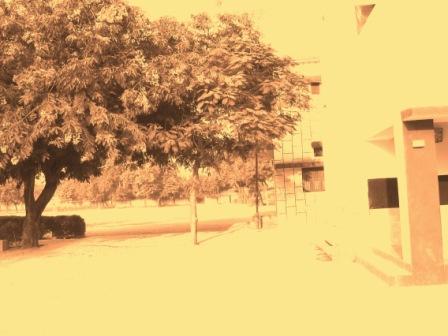Aap se nazar milaa lete hum
Zindagi ko bachaa lete hum
Aap taaroof zaraa bhi karte
Kuchh to apna pataa dete hum
Zindagi talkh hui, aakhir kab tak
Ek yaad-e-shirin ka mazaa lete hum
Gham-e-duniya ke liye waqt kahan
Khud se itne pareshaan rehte hum
Aaj shaayar hain to keh lene do
Kal sochenge kya na kehte hum
Rang har ek tha wahaan aakhir
Kab tak wafaa-e-Siyaah sehte hum
-----
Taaroof: introduction (especially formal, polite), formality
Talkh: bitter
Shirin: sweet
A work in progress...[by Siyaah]






10 comments:
Siyaah, I like this. Particularly, the sentiment behind:
Aaj shaayar hoon to keh lene do
Kal sochenge kya na kehte hum
But a couple of points to show you that I 'engaged' with the text ;)
I felt the qaafiya a bit off in the switch from the third to fourth verse: dete/lete vs rehte
Also, since you've chosen the honorific form (Ham, Aap), then perhaps to be consistent, in 5, we should have, Aaj shayar "hain" to keh "lete hain" ....
But I don't know, whether we want to be consistent, or get personal here?
Arfi:
Thanks for the engaged reading! Totally on the mark: perhaps there could be two separate threads here...ete and ehte.
And yes, the "Aaj shaayar..." came to me in a 'get personal' mode, as you said. But now I think I should change it. How about a compromise:
"Aaj shaayar hain to keh lene do; Kal sochenge kya na kehte hum".
The "lene do" still preserves some 'get personal' feel.
Yes, the compromise sounds best! :)
Nice thoughts...especially "Aaj shayar hoon..."
Liked Arfi's analysis too.
Arfi:
Glad to see you approve!
Tapasya:
Thanks! And yes, we need more engaged readers like Arfi!
I liked the shift of mood throughout, to the extent that the couplets 'Gham-e-duniya ke liye...' and 'Rang har ek tha...' seem to portray opposite sentiments.
Vibhav:
Interesting observation. It started with the first 3 couplets together, and the rest were sort of stand-alone...I guess that's the unique thing about the ghazal form - completely opposite moods can exist in the same ghazal...
Perhaps I should mention, there was a parallel Sufianya aspect as well in places, esp in the opening couplet's interpretation: "aap" could be the spiritual beloved...
Good thought indeed! I like the 'Gham-e-duniya ke liye...' couplet and my favorite here, is 'Rang har ek tha...'
sheen:
Thanks for dropping by and for your comment. Glad you liked those two couplets - I am a bit biased towards them too.
The last couplet could be read in two ways, depending on who we assume is saying it...either the poet Siyaah or someone else who was held back by "wafaa e siyaah"...
Goddd... I love the poetry! ... What a treat!
Post a Comment